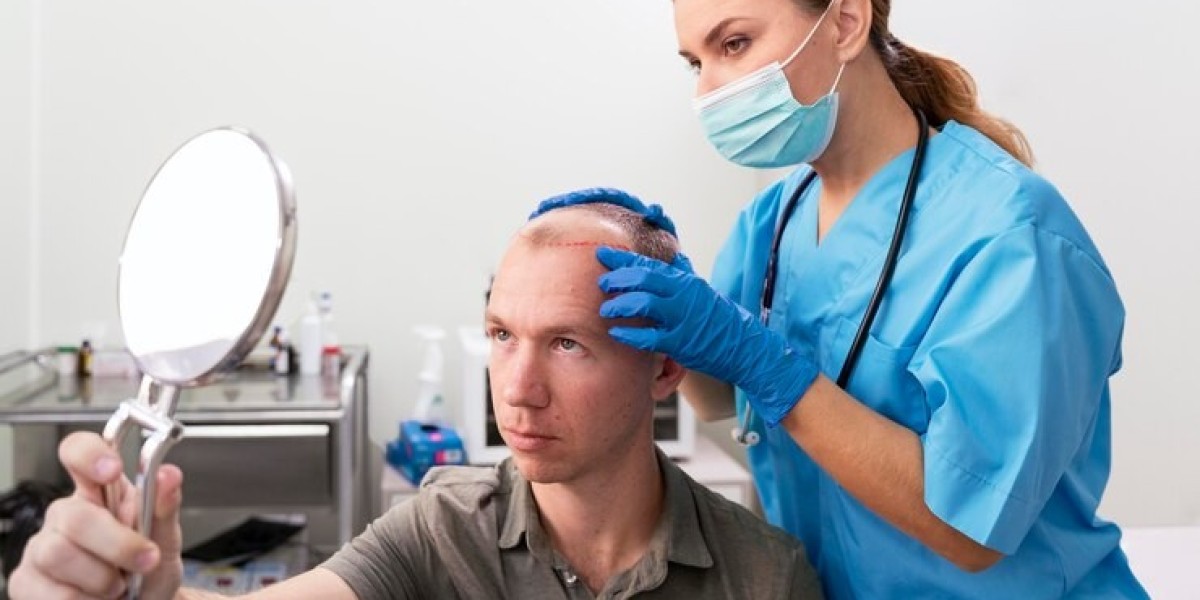Hair loss can be an emotionally distressing experience, affecting self-esteem, confidence, and overall mental well-being. Whether it's gradual thinning, receding hairlines, or complete baldness, the impact of hair loss goes beyond physical appearance. It can influence how individuals see themselves, how they interact with others, and how they navigate daily life.
For many, the decision to undergo a hair transplant is more than just about regaining hair; it's about restoring confidence and improving emotional health. In this blog, we’ll explore the emotional cost of hair loss and why a hair transplant could be the solution to reclaiming not just your hair, but your confidence and well-being.
1. The Psychological Impact of Hair Loss
Hair loss can have significant psychological effects, especially when it occurs at a young age or when it affects visible areas such as the scalp, eyebrows, or facial hair transplant تكلفة زراعة الشعر. Here are a few ways hair loss can emotionally impact individuals:
Self-Esteem: Hair is often associated with youth, vitality, and attractiveness. As hair thins or falls out, many individuals feel less attractive or less confident in their appearance. This can lead to a negative self-image and diminished self-esteem.
Social Anxiety: Many people experience a heightened sense of self-consciousness due to hair loss. The fear of being judged or ridiculed can cause individuals to withdraw from social situations or avoid public events. Some might feel insecure in professional environments, believing that their appearance impacts how they’re perceived by colleagues or clients.
Depression: For some, the emotional toll of hair loss can lead to feelings of sadness, depression, or even hopelessness. When a person's appearance drastically changes, it can be difficult to accept the new look, leading to negative emotions that extend beyond just hair loss.
The emotional strain of hair loss is often underestimated, yet it can have a profound impact on a person's mental health. These feelings of insecurity and self-doubt can affect relationships, career opportunities, and personal happiness.
2. The Decision to Get a Hair Transplant
A hair transplant offers more than just a physical solution to hair loss—it can also serve as an emotional and psychological boost. While many individuals feel they are losing part of their identity due to hair thinning or baldness, a successful transplant can help restore not just hair but also a sense of self-worth.
The decision to undergo a hair transplant, however, is deeply personal and requires thoughtful consideration. Here are some reasons why individuals choose hair transplants as a way to overcome the emotional cost of hair loss:
Restoring Confidence: For many, a hair transplant can provide an immediate boost in confidence. The ability to look in the mirror and see a fuller head of hair can make a world of difference in how one feels about themselves. This newfound confidence can enhance social interactions and professional relationships.
Improved Self-Esteem: With hair restoration, individuals often report feeling better about their overall appearance. Restoring lost hair can have a profound effect on self-esteem, as it allows people to feel more attractive and youthful once again.
A Long-Term Solution: Unlike temporary solutions such as wigs or hairpieces, a hair transplant provides a permanent solution. Knowing that the procedure can result in natural, lasting results offers peace of mind and reassurance, eliminating the constant worry about future hair loss or upkeep.
Psychological Relief: For many, the emotional relief that comes with a successful hair transplant can be just as significant as the physical results. The ability to look and feel "normal" again can reduce the anxiety, depression, and social avoidance that often accompany hair loss.
3. The Costs of Not Addressing Hair Loss
While hair transplant procedures are often considered a significant financial investment, the emotional cost of not addressing hair loss can be just as high. Here’s how:
Continued Social Anxiety and Isolation: Those who avoid social situations or withdraw due to their appearance may find themselves increasingly isolated. This can result in a diminished quality of life, as individuals miss out on personal and professional opportunities due to their hair loss-related insecurities.
Low Self-Worth: Prolonged emotional distress from hair loss can cause lasting effects on self-esteem. People may feel less valued by society or disconnected from their true self, leading to long-term issues in personal relationships and professional development.
Ongoing Stress and Anxiety: Constantly worrying about how others perceive you, avoiding cameras, and feeling uncomfortable in your own skin can lead to chronic stress and anxiety. This can affect mental health, sleep, and overall well-being.
Attempting Ineffective Solutions: Many individuals try temporary fixes—such as hair fibers, wigs, or over-the-counter products—in an attempt to address hair loss. These solutions often don't provide lasting results and can sometimes exacerbate the emotional toll of hair loss by emphasizing its existence rather than providing a permanent solution.
By opting for a hair transplant, individuals take control of their appearance and their emotional health, investing in both their physical and psychological well-being.
4. How Hair Transplants Restore More Than Just Hair
Hair transplant procedures don’t just restore hair—they help restore a sense of self, a feeling of control, and an improved outlook on life. Beyond the visible transformation, the positive effects on mental health are profound. Here's how:
A Sense of Empowerment: Undergoing a hair transplant empowers individuals to take action against something that has negatively affected them. The ability to invest in oneself—physically, emotionally, and financially—can be a liberating and empowering experience.
Social and Professional Opportunities: Hair transplants can open up new opportunities for individuals who may have felt held back due to their appearance. Whether it’s a job interview, a romantic relationship, or simply socializing with friends, regaining a youthful, confident appearance can make these experiences easier and more fulfilling.
Emotional Healing: Many patients report feeling emotionally healed after a successful transplant, as the procedure helps them reconcile their internal self-image with their external appearance. This emotional restoration can improve their overall quality of life and mental health.
5. The Role of Psychological Support in the Hair Transplant Process
It’s essential to recognize that the emotional aspect of hair loss and the decision to undergo a transplant should not be overlooked. Psychological support before, during, and after the procedure can play a vital role in ensuring a positive experience.
Clinics that offer counseling or emotional support can help patients set realistic expectations, prepare for the changes to come, and understand the long-term benefits of their investment. Additionally, many clinics provide post-transplant care that includes not just physical healing but also emotional support to ensure the patient’s confidence continues to grow as they see results.
Conclusion
Hair loss is not just a physical condition—it can be an emotionally taxing experience that impacts self-esteem, mental health, and overall quality of life. A hair transplant offers more than just a solution to hair loss; it provides an opportunity to restore confidence, alleviate emotional distress, and reclaim a sense of self-worth. By addressing both the physical and emotional costs of hair loss, individuals can transform their lives in ways that go beyond just hair restoration. A hair transplant is an investment not only in your appearance but in your mental well-being, helping you regain your confidence and enjoy life to the fullest.









